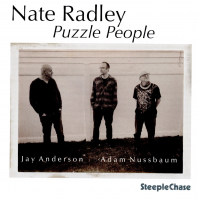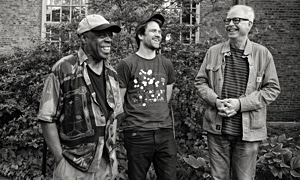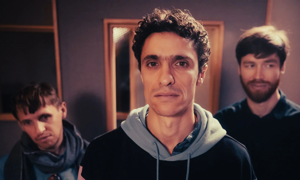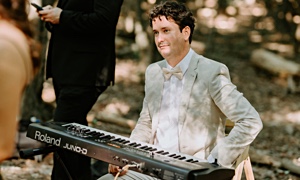Home » Jazz Articles » Six Picks » January 2022
January 2022
 Bendik Hofseth
Bendik Hofseth Roots
C+C records
2022
The second act in the Norwegian saxophonist's Forest tetralogy, Roots focuses around Bendik Hofseth's chamber-jazz qualities in the company of a string quartet plus guitarist Eivind Aarset and percussionist Per Oddvar Johansen, who both return for a second time out after 2020's Trunks. The music shifts between sparse landscapes, brief interludes and atmospheric elaborations, mostly conjured by Hofseth's particularly versatile and stirring saxophone playing. The largest part of the ensemble is pushed in the background for the majority of the album, accompanying the saxophone with harmonically comprehensive yet spacious arrangements that leave some filling out of the musical canvas to imagination. Hofseth dedicates the compositions to a variety of musicians and composers, from Fela Kuti and John Lennon to Johan Sebastian Bach, and the colorfulness of the dedicatees is reflected in the rich variety of the music and its diverse inspirations. The album's range covers everything from cinematic soundscapes "woodwideweb" to early 20th century chamber-tones in "Fibrous Roots" and structures reminiscent of baroque counterpoint in "Back To The Beginning," while the pieces' titles may rather be allusions to the music's origins than mere word-play. Instead of belonging in different categories though, the music on Roots has a more holistic appeal to it, separated from genre and rather harks back to something more ancestral and untouched. The third volume of the Forest project, Branches, is released coincidingly with this album and reflects yet another aspect of Hofseth's musical personality by focusing on his song-oriented pop-predilections. Something for jazz aficionados and Sting-fans alike.
 Dave Stryker
Dave Stryker As We Are
Strikezone Records
2022
To continue with the string theme: the string-quartet albums of jazz artists otherwise not known for working in that framework have a tendency of sounding either pompous or somewhat uninspired, as it's hard to find a subtle way to integrate such an independent unit with its rich history into the interplay of another group—be it a trio, a quartet or whatnot—with its own, slightly younger but equally rich history. Then again, why see them as separate? Piano virtuoso Hiromi was able to add her worthy entry into the string-quartet-meets-jazz-group attempt to the canon with Silver Lining Suite (Concord Jazz, 2021), and Dave Stryker's As We Are is yet another example of a successful pairing of the two traditions. Neither affected nor prosaic, the guitarist's compositions blossom in the tapestry of the string-arrangements, contributed by Stryker's ex-student and pianist Julian Shore. John Patitucci and Brian Blade are the remaining parts of the successful equation and add their experienced voices to seven Stryker-originals, one cut by Shore and a quasi-orchestral take on Nick Drake's "River Man," from the songwriter's break-out debut album Five Leaves Left (Island Records) from 1969. Stryker has a reputation for smooth soloing in straight-ahead contexts and his signature verve and seamless fret-navigation is on full display throughout the set—disguised in bossa-nova-claves on "Saudade," post-bop flourishes on the swinging "One Thing At A Time" and bluesy turnarounds on the ballad "Dreams Are Real" and the joyful "Soul Friend." Few drummers are as adaptable yet equally recognizable as Blade and the same could be said for Patitucci when it comes to bassists—both ideal partners for this occasion. Their firm groundwork and confident solos are elegantly completed by the diversely arranged strings with violinist Sara Caswell performing several dazzling solos.
 Manu Codjia
Manu Codjia Phases
Hypnote Records
2022
French guitarist Manu Codjia may be best known for following in the footsteps of the other French guitar-luminary Nguyen Le in Henri Texier's group and can be heard contributing his signature crossover-fusion style alongside the legendary bassist on his albums from the early 2000s as well as Sand Woman (Label Bleu, 2017) and Chance (Label Bleu, 2019). At the same time of this release, Codjia also appears on Emile Parisien's vivacious sextet recording, Louise (ACT Music, 2022), which should prove one of the early highlights of the year. Besides his famed work as a sideman though, the guitarist continues to refine his chops over several leader-dates, starting with a trio collaboration featuring bassist Francois Moutin on 2007's Songlines (Bee Jazz) and including the 2013 Charlie Parker homage Looking For Parker (2013). On this trio date—his first with bassist Giuseppe Millaci and drummer Lieven Venken—Codjia takes up a handful of standards in combination with several originals and a couple of atmospheric improvisations in a tight set that performs a balancing act between dense interplay and atmospheric sound exploration. The improvisations, called "Phase I" through "III," divide the album in three and add a dreamily calm counterpoint to the swiftness of notorious charts like the Guy Wood-penned "My one and only Love" or "How my Heart Sings." But no matter which melody the group tackles—known or new—Codjia neatly makes it his own. By improvising against the beat, adding a layer of echo but then quickly switching into a dry bebop tone and by going paths that defy the expected, the guitarist puts his own spin on things and invites his capable sidemen in on an adventurous trio expedition that is arguably Codjia's best album to date. "al blade," of which different renditions were previously featured on the afore-mentioned Songlines and the 2014 guitar-trio summit Ives, which saw Codjia team up with fellow guitarists Samo Salamon and Mikkel Ploug, is a compositional highlight, as is Venken's twang and blues-tinged "Frozen Boots." The obvious stylistic nod to John Scofield doesn't take away from the trio's individual punch on the groovy tune.
 Nate Radley
Nate Radley Puzzle people
Steeple Chase Records
2022
Speaking of John Scofield—the impact the influential guitarist has had on generations of guitarists can't quite be put to words and his weight can also be felt on Nate Radley's new trio offering Puzzle People. There's that laid-back blues feeling in Radley's pentatonic riffing (obviously coming more than naturally to a tune that carries the title "Invitation To The Blues"), the spontaneous whiff of unburdened melodiousness in the midst of soloing through a ballad like "I'll See You In My Dreams" and then the sudden bursts of rapid technical dexterity in bebop design as portrayed on Radley's own piece "Kamikaze Frisbee"—all qualities, when combined, often associated with Scofield. Another strength which Radley excels at just like Scofield is coming up with melodies that stick. The set comprises nine pieces, of which five are penned by the leader himself, the remaining four being standards. The title track is made up of one of those remarkably simplistic yet ingenious "question and answer"-heads, inviting sidemen Adam Nussbaum and Jay Anderson in for conversational trio-exchanges that give each player a chance to shine. On "Bubble Trouble" the group seems to morph into a formation from another century, swapping out a certain over-hurriedness of our time with the relaxed pulse of slower days that hides the nuances in dynamics and beautifully stacked melodies performed concurrently on Radley's six-string and proving of the leader's remarkable harmonic grasp. His unpretentious tone and unique voicings are all over this album and set up the stage for Nussbaum to react with his signature percussive style— always aware of the harmonic framework that surrounds the beat. The trio's interplay is never rash but filled with color and subtleties that reveal themselves little by little and testify to the fact that these trio partners make up a rare, natural fit. One has only to listen to their extended take on "Golden Earrings" (Victor Young) to know what striking musicality is at play.
 Harald Bergersen
Harald Bergersen Baritone
Losen Records
2022
The baritone sax has a truly unique timbre that's immediately recognizable and exudes special warmth in jazz contexts. Harald Bergersen seems to think the same and here dedicates an entire album to the instrument. In quartet with guitar, bass and drums the Norwegian woodwind doyen (born in 1937) delivers a patiently swinging set of standards with two original compositions by himself and guitarist Bård Helgerud sprinkled in between. Bergersen's attack is soft, his tone round rather than raspy and his lungs are capable of firm sustain, drenching ballads like "Merlin" in wistful romanticism. It's not the kind of jazz that's jam-packed with big virtuoso gestures, extensive solo exchanges or any other elaborate tricks with time signatures and whatnot—instead the quartet delivers a tight set of comfortable tunes that swing, crackle and pop as they're supposed to, with brush-swishes, post-bop guitar licks according to the books, a bass that walks and all that... Wonderful jazz for comfort and feeling rather than contemplation or hard thinking—a compliment to the smoothness of the group's flawless musicianship for sure.
 Andrew Cyrille William Parker Enrico Rava
Andrew Cyrille William Parker Enrico Rava 2 Blues For Cecil
TUM Records
2022
Recorded shortly after the trio's tribute concert for late piano legend Cecil Taylor in December 2020, 2 Blues For Cecil presents three great improvisers of our times, each with strong and multiple ties to Taylor, exploring the freer depths of their musical inclinations with eloquence and abandon. There's a particularly striking sense of unpretentiousness in the way the trio communicates in the completely freely improvised passages of the album, creating, elaborating and bending shapes and forms as even the whiff of an idea enters a player's mind. Flexible but robust, nuanced yet with thrust and rigor—Enrico Rava, Andrew Cyrille and William Parker do little to suggest their wisdom in years (born in 1952 Parker is the youngest member of the band and at 82 years young Rava the most senior musician, beating Cyrille by only three months), but instead prove of their still youthful minds, abound with inspiration, keen instinct and quick reflexes. The more spontaneous a session, the bigger the risk (one could assume), and there are moments here, as towards the finishing bars of "Blues For Cecil No. 1," where the interplay between the three doesn't always gel and brief cues or slight nods seem to get lost in concentration. But even these rare moments speak to the authenticity and quality of the musicians, as they're able to quickly re-navigate their interaction towards yet more inspired musings.
Tracks and Personnel
RootsTracks: Taproot (to Paolo Vinaccia); Underground Inventor (to Felafels Kuti); When Roots Are Deep (to Jon Christensen); Anchorage (to Nana Vasconcelos); woodwideweb (to Franz Schubert); Fibrous Root (to Ray Phiri); A Source Supreme (to John Coltrane); Origins (to Lyle Mays); Some Help From Our Friends (to John Lennon); Bach to the Beginning (to Johan Sebastian Bach).
Personnel: Bendik Hofseth: voice, saxophone, piano, programming; Eivind Aaarset: guitar; Per Oddvar Johansen: drums; Arvid Engegård: violin; Sara Chen: violin; Juliet Jopling: viola; Jan Clemens Carlsen: cello.
As We Are
Tracks: Overture; Lanes; River Man; Hope; Saudade; One Thing At A Time; As We Were; Dreams Are Real; Soul Friend.
Personnel: Dave Stryker: guitar; Julian Shore: piano; John Patitucci: bass; Brian Blade: drums.
Phases
Tracks: Phase I; How My Heart Sings; Stingy Lulu Blues; Al Blade; Phase II; My One And Only Love; Turn Over; Frozen Boots; Phase II;
Personnel: Manu Codjia: guitar; Giuseppe Millaci: bass; Lieven Venken: drums.
Puzzle People
Tracks: Invitation To The Blues; Sing Sing Overkill; Who's Sorry Now; I'll See You In My Dreams; Kamikaze Frisbee; Golden Earrings; Puzzle People; Bubble Trouble; The Horseless Headman.
Personnel: Nate Radley: guitar; Jay Anderson: bass; Adam Nussbaum: drums.
Baritone
Tracks: Freight Trane; Maus Melhores Moments; Merlin; Waltz For You; Undecided; Chelsea Bridge; Three And One; Summer Serenade; Blues in the Closet; Another Time, Another Place; A Ballad; Observing.
Personnel: Harald Bergersen: baritone saxophone; Bård Helgerud: guitar; Fredrik Nilsen: double bass; Torstein Ellingsen: drums & percussion.
2 Blues For Cecil
Tracks: Improvisation No. 1; Ballerina; Blues For Cecil No. 1; Improvisation No. 2; Top, Bottom and What's in the Middle; Blues For Cecil No. 2; Enrava melody; Overboard; Machu Picchu; My Funny Valentine.
Personnel: Enrico Rava: flugelhorn; William Parker: double bass; Andrew Cyrille: drums.
Tags
Six Picks
Pat Youngspiel
C+C Records
Bendik Hofseth
Eivind Aarset
Per Oddvar Johansen
Fela Kuti
John Lennon
Strikezone Records
Hiromi
Dave Stryker
Julian Shore
John Patitucci
Brian Blade
Hypnote Records
Manu Codjia
nguyen le
Henri Texier
Sand Woman
Chance
Emile Parisien
Francois Moutin
Giuseppe Millaci
Lieven Venken
Samo Salamon
Mikkel Ploug
Steeple Chase Records
John Scofield
nate radley
Adam Nussbaum
Jay Anderson
Losen Records
Harald Bergersen
Cecil Taylor
Enrico Rava
William Parker
PREVIOUS / NEXT
Support All About Jazz
 All About Jazz has been a pillar of jazz since 1995, championing it as an art form and, more importantly, supporting the musicians who make it. Our enduring commitment has made "AAJ" one of the most culturally important websites of its kind, read by hundreds of thousands of fans, musicians and industry figures every month.
All About Jazz has been a pillar of jazz since 1995, championing it as an art form and, more importantly, supporting the musicians who make it. Our enduring commitment has made "AAJ" one of the most culturally important websites of its kind, read by hundreds of thousands of fans, musicians and industry figures every month.








![Full Moon [Feat. New York Voices, Mark Egan]](https://s3.amazonaws.com/allaboutjazz/coverart/large/a07a6f1d5edcd6c801f0e1c3b527da37.jpg)















